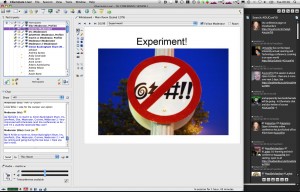One of the crucial aspects of becoming a more open project is that we can share our thinking, opening it up for debate and discussion. We want to discuss the principles underpinning SocialLearn, to show how they were implemented on our Closed Beta site, and to share what we have learned.
To start with – what do we mean when we talk about ‘social learning’? What is learning ‘based on the premise that our understanding of content is socially constructed through conversations about that content and through grounded interactions, especially with others, around problems or actions’ (Seely Brown & Adler, 2008).
 To give an example: I want to learn why someone has sawed down half of the beautiful cedar tree outside my office window. I can’t easily find this out from a book or a website, and I don’t know anyone with the precise knowledge that I am looking for. It is as I engage in conversations with different people that my understanding of what I see outside my window increases and I learn more about the tree’s history, health, ecosystem and future possibilities.
To give an example: I want to learn why someone has sawed down half of the beautiful cedar tree outside my office window. I can’t easily find this out from a book or a website, and I don’t know anyone with the precise knowledge that I am looking for. It is as I engage in conversations with different people that my understanding of what I see outside my window increases and I learn more about the tree’s history, health, ecosystem and future possibilities.
It’s not just the social construction of understanding that’s important – that is a part of most human interactions. My intention to learn is part of what makes this social learning, as are my interactions with others. This isn’t a one-sided engagement with books or with online content, it involves social relationships. As such, it has lots of ‘affective’ aspects – people must be motivated to engage with me and I must have the confidence to ask questions in the first place, as well as some way of assessing the expertise of the people I’m talking to.
I’m not convinced that ‘social learning’ is a useful term in a purely face-to-face context. Without the Internet, social learning is just a subset of social constructivism, with an emphasis on affective and interpersonal elements. It may sound more user friendly, but it’s just another label – and not one that adds much to our understanding.
Web 2.0 extends the possibilities for social learning, making it possible not only to locate and access a vast amount of content from all around the world, but also to engage in extended interaction around and about this material. Learners – particularly those learning outside formal settings such as schools and colleges – may find themselves adrift in an ocean of information, struggling to solve ill-structured problems, with little clear idea of how to solve them, or how to recognise when they have solved them. It’s here that social learning has its place – helping people to use these resources to construct knowledge together effectively.
Social learning can take place when people:
• clarify their intention – learning rather than browsing
• ground their learning – by defining their question or problem
• engage in focused conversations – increasing their understanding of the available resources.
These three actions help us to build meaningful connections online, and offer learners the benefits of co-operative activity and of collaboration.
The challenge for SocialLearn is to support and encourage users to clarify their intention, ground their learning and engage in focused conversations.
 In this narrower bandwidth medium, giving talks and fielding questions is a reasonable experience (but missing the more subtle audience feedback like laughter and attention levels, and the sense of the speaker’s presence). The key challenge is how good people feel the social interaction is, which is after all an essential part of what a conference is.
In this narrower bandwidth medium, giving talks and fielding questions is a reasonable experience (but missing the more subtle audience feedback like laughter and attention levels, and the sense of the speaker’s presence). The key challenge is how good people feel the social interaction is, which is after all an essential part of what a conference is.

